Watching a tiny puppy cry out in hunger is, in a word, heartbreaking. Fortunately, there are a number of puppy milk replacements that you can use to bottle feed a hungry little harrier or starving Shih Tzu.
But not all milk replacers are created equally, and you’ll want to select the best possible option to ensure your peckish pup gets the nutrition he needs.
Quick Picks: Best Puppy Milk Replacements
- #1: Pet Ag Esbilac [Best Overall Milk Replacement]: An American-made milk replacement made with a balanced blend of protein, fats, and carbohydrates, as well as probiotics for digestive health.
- #2: PetLac [Most Affordable Milk Replacement]: A cow’s milk-based powder containing the vital nutrients your puppy needs that won’t blow your budget.
- #3: Goat’s Milk Esbilac [Best Cow Milk Alternate]: A powdered recipe designed for sensitive systems with real goat’s milk and all the essential nutrients your puppy needs to thrive.
Reasons You May Need Milk Replacers for Puppies
Most dog litters proceed from whelping to weaning without difficulty.
Mother Nature has gone to a lot of trouble to ensure that mammals can feed their offspring – she even built in a few redundancies to help cope with problems. For example, most mammals have twice as many nipples as the average number of offspring; and thankfully, litters containing more offspring than nipples are quite rare.
But bad things happen. Milk dams can die during labor or develop illnesses that prevent them from producing or delivering the milk required. Many litters contain a runt, who simply has trouble competing with his siblings.
In such cases, you’ll need to provide some alternative nourishment to keep your pups alive and give them the best chances for living a long, healthy life.
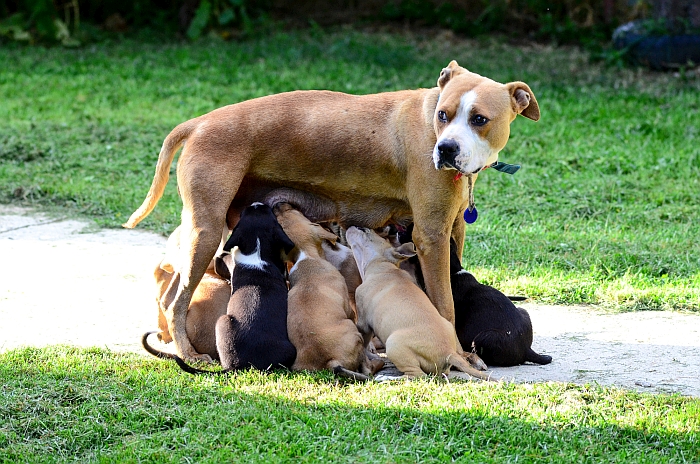
Why Not Just Give Puppies Cow Milk?
As you may expect, Mother Nature also put a lot of work into creating a good recipe for puppy milk.
In fact, the milk of every species is uniquely tailored to the needs of the growing young. People milk is good for growing people, cow milk is good for growing cows and almond milk – well, that’s a whole different thing, but you take my point.
The point is, cow milk is not very good at growing healthy puppies. Cow milk lacks the appropriate ratio of amino acids for puppies, and its basic composition is inappropriate for puppy maintenance. Cow milk only has about half of the fat and one-third of the protein that dog milk does, yet it has much more sugar. Additionally, cow milk is much thinner than dog milk. The composition of goat milk is even less suitable for dogs.
Additionally, in practice, cow and goat milk often cause digestive upset in puppies. Some puppies can be allergic to cow or goat milk, which can lead to even more serious complications.
The good news is that, most puppies appear to tolerate the dehydrated/powdered forms of these milks better. In fact, many powdered versions are used as the base for milk-replacement products.
Still, it’s best to get products designed specifically to serve as milk replacement for puppies. These uniquely tailored puppy milk replacements also include a number of supplemental ingredients, which will help to make up for the differences between puppy milk and cow milk.
If you’ve found yourself in a position where you’ll have to bottle feed a puppy DIY style, the video below can help provide some guidance on bottle feeding your pup:
The Best Milk Replacers for Puppies
If you find yourself in need of a high-quality puppy milk replacer, consider the following five products. Each has received high marks from dog owners who have tried them, and they are all designed to provide the nutrition your puppies need to grow up big and strong.
1. Esbilac Puppy Milk Replacement Powder
This is a sponsored placement, in which an advertiser pays a fee to be featured in this article. Learn more
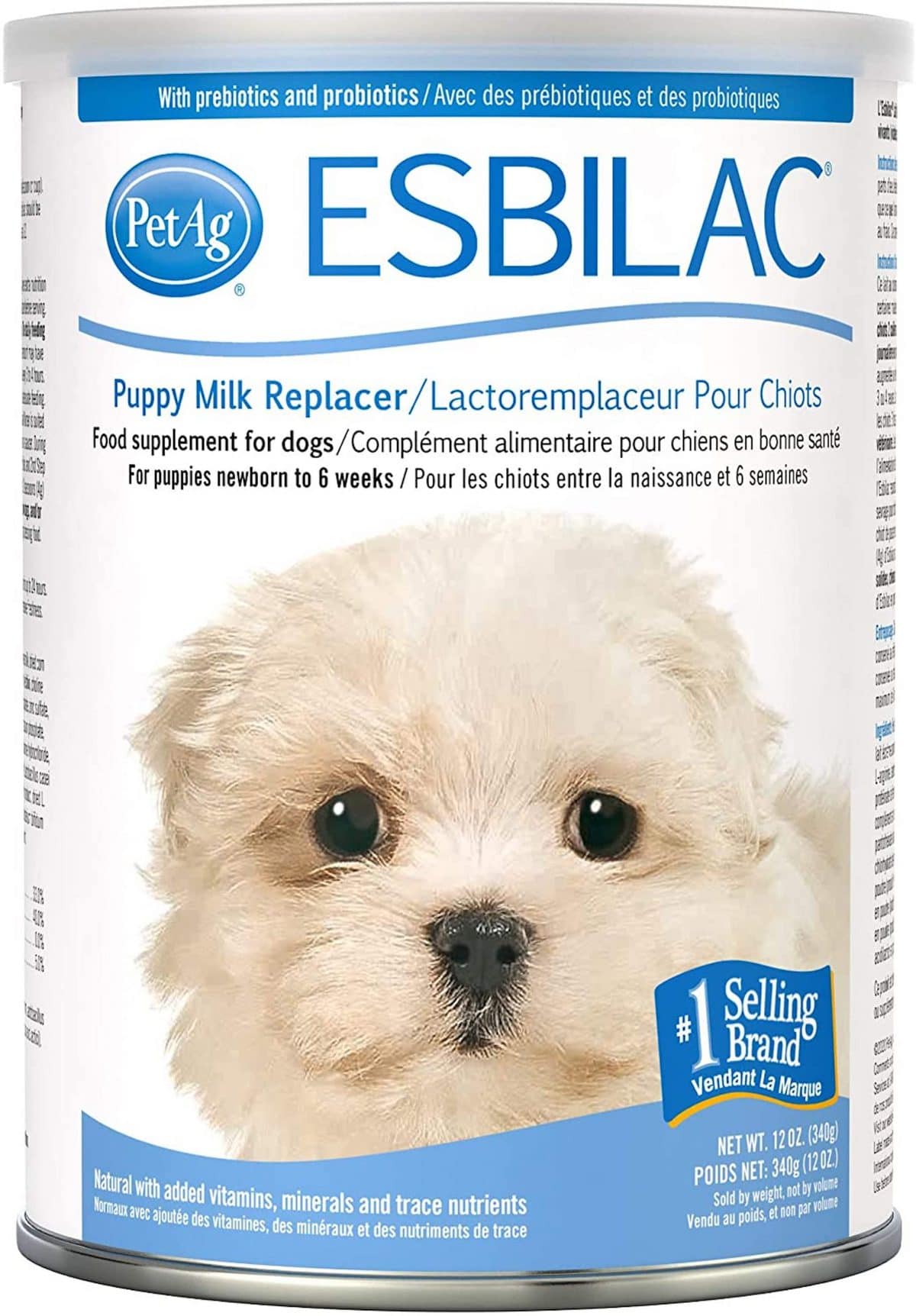
Esbilac Puppy Milk Replacement Powder
A US-made milk replacement made with a balanced blend of protein, fats, and carbohydrates, as well as probiotics.
About: Esbilac Powder is an easily digestible, highly palatable puppy milk replacement formula designed to deliver high-quality nutrition for your pre-weaned pups.
Features:
- The vegetable-oil- and milk-based formula is easy for puppies to digest
- Fortified with vitamins and minerals to provide the complete nutrition a growing puppy needs
- Can be refrigerated and stored for 24 hours after mixing
Pros
- Most owners reported that it worked well
- Trusted choice for veterinarians, professional breeders, and animal shelters
- Contains an assortment of belly-boosting probiotics
Cons
- Some owners report issues with the powder dissolving properly
- Pricing is a tad higher than other options
Ingredients List
Vegetable oil, dried skimmed milk, casein, cream, DL-methionine...,
L-arginine, calcium carbonate, choline chloride, lecithin, magnesium sulfate, potassium chloride, monopotassium phosphate, salt, tricalcium phosphate, carrageenan, dipotassium phosphate, taurine, ascorbic acid, ferrous sulfate, zinc sulfate, vitamin A supplement, vitamin E supplement, niacin supplement, calcium pantothenate, copper sulfate, thiamine hydrochloride, pyridoxine hydrochloride, riboflavin, manganese sulfate, vitamin D3 supplement, potassium citrate, potassium iodide, folic acid, vitamin B12 supplement, menadione sodium bisulfite complex, biotin.
2. Nutri-Vet Milk Replacement for Puppies
This is a sponsored placement, in which an advertiser pays a fee to be featured in this article. Learn more
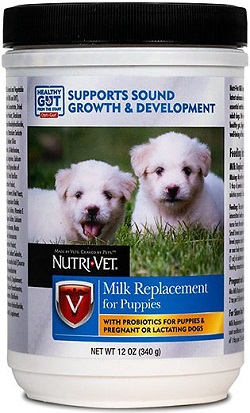
Nutri-Vet Milk Replacement for Puppies
A probiotic-packed supplement that nourishes puppies with a vet-created mixture of proteins, fats, and vitamins.
About: Nutri-Vet Milk Replacement For Puppies is made with the Nutri-Vet’s “Opti-Gut blend” of probiotics for healthy digestion.
Features:
- Whey protein-based formula
- Vet-formulated recipe for optimum puppy nutrition and development
- Comes with a National Animal Supplement Council (NASC) quality seal
- Made in the USA
Pros
- Vet-created recipe ensures balanced puppy nutrition
- Includes an assortment of probiotics for improved digestion
- Reasonably priced
Cons
- Some owners reported the consistency caused nipple blockages
- Some experienced mixing or dissolving issues
Ingredients List
Animal & vegetable fat (preserved with BHA and BHT), dried whey protein concentrate...,
dried whey, dried whey product, dicalcium phosphate, l-lysine monohydrochloride, sodium caseinate, potassium sorbate, sodium silico aluminate, lecithin, dl-methionine, choline chloride, l-Arginine, calcium chloride, mono and diglycerides of edible fats or oils, dried Bacillus subtilis fermentation product, hydrolyzed yeast, brewer’s dried yeast, artificial flavor, magnesium oxide, ferrous sulfate, zinc sulfate, vitamin E supplement, copper sulfate, calcium sulfate, calcium carbonate, niacin supplement, dried Enterococcus faecium fermentation product, manganese sulfate, sodium selenite, vitamin A acetate, ascorbic acid, ethylenediamine dihydriodide, vitamin D3 supplement, cobalt sulfate, calcium pantothenate, thiamine mononitrate, riboflavin supplement, pyridoxine hydrochloride, folic acid, vitamin B12 supplement
3. Goat’s Milk Esbilac
This is a sponsored placement, in which an advertiser pays a fee to be featured in this article. Learn more
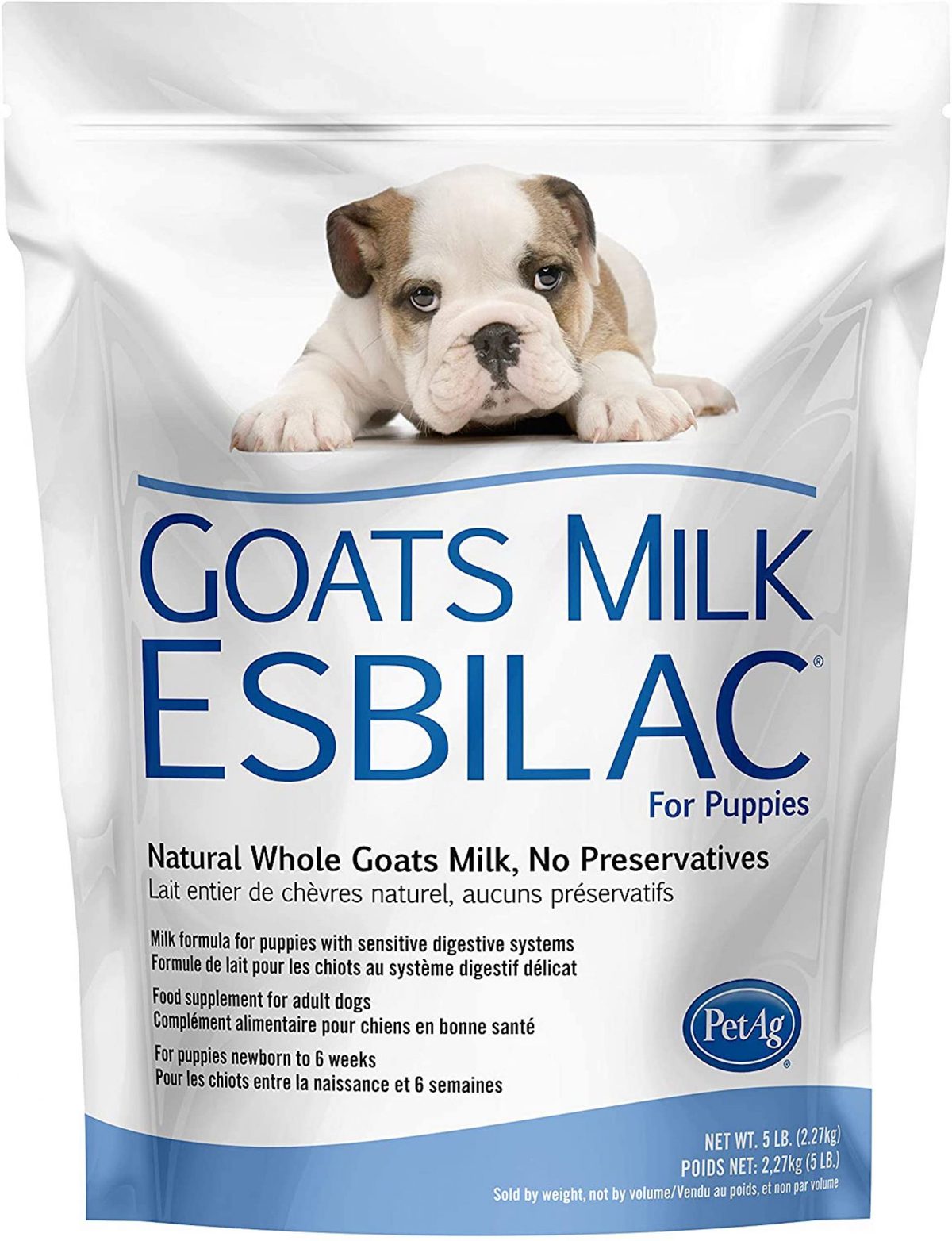
Goat’s Milk Esbilac
A powdered recipe for sensitive systems with goat’s milk and all the essential nutrients your puppy needs to thrive.
About: Esbilac’s Goat’s Milk Formula is a goat’s-milk-based replacement product, made without cow’s milk. This type of recipe can be easier for some dogs with unique intolerance issues to digest, and therefore a superior option in such cases.
Features:
- Dried whole goat milk is the first listed ingredient
- Can be stored for 24 hours after mixing if refrigerated
- Fortified with vitamins and minerals for proper growth and development
- Can also be used for convalescent or post-operative dogs, as well as orphaned squirrels, rabbits or opossums
Pros
- Great choice for dogs who don’t tolerate cow’s milk
- Most owners report puppies digested the milk well
- Powder can be frozen for up to 6 months if needed
Cons
- On the pricier side
- Goat’s milk is less like dog’s milk than cow’s milk
Ingredients List
Dried whole goat milk, soybean oil, calcium sodium caseinate, calcium carbonate...,
choline chloride, monopotassium phosphate, salt, L-arginine, DL-methionine, lecithin, dipotassium phosphate, carrageenan, magnesium sulfate, zinc sulfate, ferrous sulfate, silicon dioxide, copper sulfate, vitamin E supplement, calcium pantothenate, ascorbic acid, niacinamide, maltodextrins, vitamin A supplement, vitamin D3 supplement, manganese sulfate, folic acid, riboflavin, vitamin B12 supplement, thiamine hydrochloride, pyridoxine hydrochloride, biotin.
4. PetLac Milk Powder for Puppies
This is a sponsored placement, in which an advertiser pays a fee to be featured in this article. Learn more
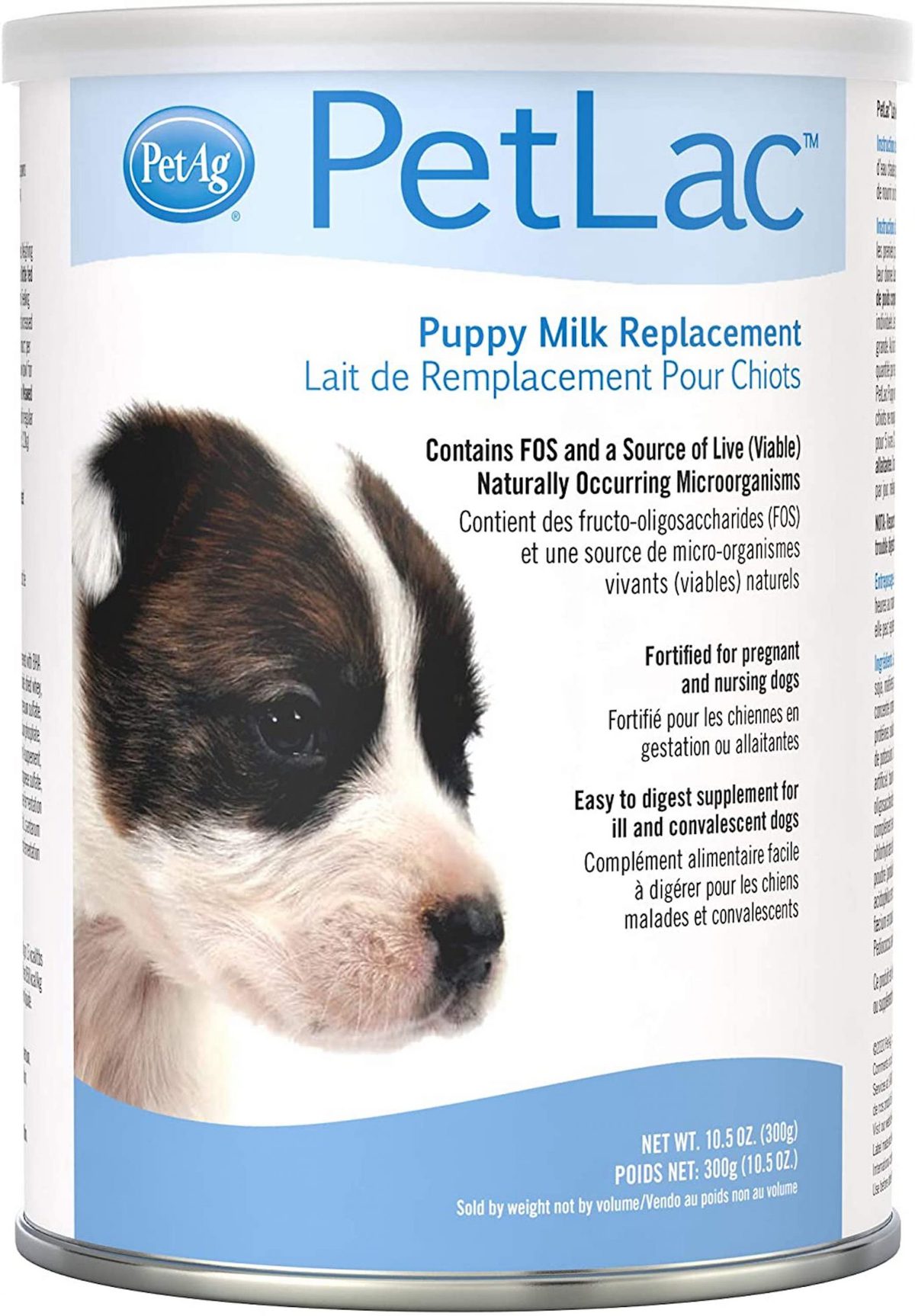
PetLac Milk Powder for Puppies
A cow’s milk-based powder containing the vital nutrients your puppy needs that won’t blow your budget.
About: PetLac Milk Powder is a vegetable-oil and cow’s-milk-based formula, designed to help your puppies survive when natural dog milk is unavailable.
Features:
- Made with dry skimmed milk and soy to provide the protein a growing puppy needs
- Fortified with vitamins and minerals to ensure complete nutrition
- Made with six different probiotic strains to support proper digestive function and the breakdown of lactose
Pros
- Affordably priced
- Finely ground formula mixes easily
- Many owners reported their puppies thrived on this formula
Cons
- A larger canister option would be ideal
- Some puppies struggle to digest cow’s milk formulas like this one
Ingredients List
Vegetable oil, dried skimmed milk, soy protein isolate, casein, dicalcium phosphate...,
maltodextrins, choline chloride, sucrose, dried Lactobacillus casei fermentation product, dried L. fermentum fermentation product, dried L. acidophilus fermentation product, dried L. plantarum fermentation product, dried Enterococcus faecium fermentation product, dried Bifidobacterium bifidum fermentation product, dried Pediococcus acidilactici fermentation product, monopotassium phosphate, L-arginine, DL-methionine, fructooligosaccharide, magnesium sulfate, potassium chloride, taurine, ferrous sulfate, natural and artificial flavor, salt, dipotassium phosphate, calcium pantothenate, ascorbic acid, niacin supplement, copper gluconate, zinc sulfate, folic acid, silicon dioxide, vitamin E supplement, vitamin A supplement, riboflavin, vitamin B12 supplement, thiamine hydrochloride, pyridoxine hydrochloride, vitamin D3 supplement, ethylenediamine dihyrdoiodide, biotin.[/thrive_toggles]
5. Manna Pro Nurse All Non-Medicated Milk Replacer
This is a sponsored placement, in which an advertiser pays a fee to be featured in this article. Learn more
About: Manna Pro Milk Replacer is actually formulated for 9 different baby animals (calves, foals, goat kids, baby pigs, fawns, alpacas and elk calves), but some dog owners have used it to support pre-weaned puppies.
This may be a good choice for your puppies – just be sure to check with your vet first, as this formula is a bit different.
Features:
- Protein is derived solely from milk products
- Supplemented with vitamins and minerals to ensure your baby animals get the nutrition they need
- Easy to mix powdered formula is quite convenient
- Supplemented with two different probiotics to support proper digestive health
Pros
- Can be used for a wide array of animals found around the farm
- Affordably priced
- Doesn’t contain soy, an occasional allergen in dogs
Cons
- Not formulated specifically for dogs
- Not every pup cares for the taste
Ingredients List
Dried whey protein concentrate, animal fat (preserved with BHA and BHT)...,
dried whey product, dried skimmed milk, dried whey, dried milk protein, coconut oil, lecithin, potassium sorbate (a preservative), citric acid (a preservative), dicalcium phosphate, hydrolyzed yeast, brewer’s dried yeast, l-lysine, calcium carbonate, calcium silicate, maltodextrin, artificial flavor, dl-methionine, sodium silico aluminate, dried Bacillus subtilis fermentation product, dried Enterococcus faecium fermentation product, ferrous sulfate, vitamin E supplement, choline chloride, dextrose, zinc sulfate, selenium yeast, vitamin A supplement, manganese sulfate, ascorbic acid, niacin supplement, biotin, vitamin D3 supplement, calcium pantothenate, vitamin B12 supplement, copper sulfate, folic acid, riboflavin supplement, thiamine mononitrate, cobalt sulfate, mineral oil, calcium iodate, menadione sodium bisulfite complex (source of vitamin K activity), and pyridoxine hydrochloride.
6. Vets Preferred Advanced Milk Rx Supplement
This is a sponsored placement, in which an advertiser pays a fee to be featured in this article. Learn more
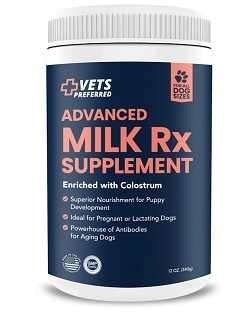
Vets Preferred Advanced Milk Rx Supplement
A US-made milk substitute that features colostrum, a natural part of nursing that most bottle-fed puppies miss out on.
About: Vets Preferred Advanced Milk Rx Supplement contains colostrum, a nutrient-rich source of antibodies and protein produced by lactating dogs in the first few days of nursing puppies.
Features:
- Vet-designed recipe ensures adequate nutrients for developing puppies
- Great source of proteins and calcium
- Manufactured in a GMP-certified facility
- Made in the USA
Pros
- Contains colostrum, the prized gem of nursing nutrition
- Excellent pricing for a vet-made formula
- Comes with a 30-day money-back guarantee from the manufacturer
Cons
- No probiotics included
- Can be tricky to mix into the desired consistency
Ingredients List
Animal & vegetable fat, dried whey protein concentrate, dried whey, sodium caseinate...,
dicalcium phosphate, dried corn syrup for flavor, l-arginine, dl-methionine, spray dried egg product, calcium carbonate, lecithin, potassium sorbate, calcium chloride, dried colostrum, choline chloride, magnesium oxide, iron sulfate, zinc sulfate, manganese sulfate, calcium sulfate, copper sulfate, sodium selenite, ethylenediamine dihydroiodide, cobalt sulfate, dl-alpha tocopherol acetate, vitamin A acetate, d-activated animal sterol, ascorbic acid, vitamin B12 supplement, riboflavin, niacin, calcium pantothenate, biotin, folic acid, pyridoxine hydrochloride, thiamine mononitrate, l-lysine, mono and diglycerides of edible fats or oils, Sodium silico aluminate, artificial flavor
How to Feed Puppies a Milk Replacement
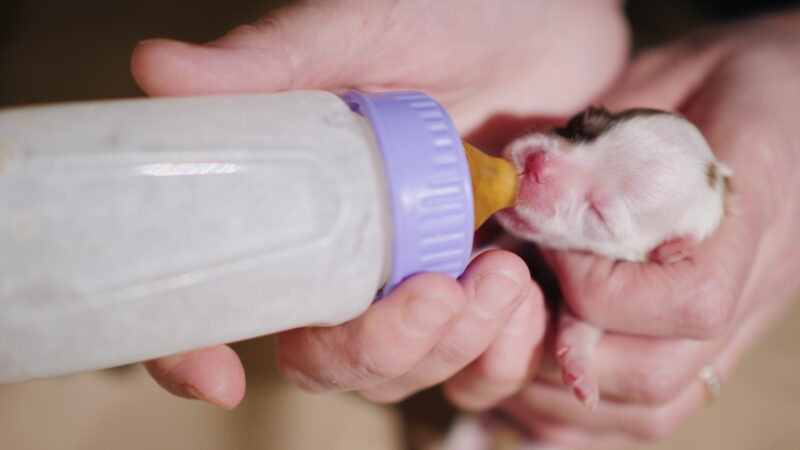
Playing the part of a mama dog might not be natural for you, but it’s not too complicated once you know the basics. It boils down to following some simple dos and don’ts:
Do:
- Try to use a small, animal-safe bottle. A bottle with a nipple is generally the easiest, cleanest, and most natural way to replicate nursing. Most puppies latch and suckle as instincts kick in, though some might need a little encouragement to get started. Try wetting the nipple portion with some milk replacer to entice the puppy to latch, if need be.
- Alternatively, use a liquid syringe. Not every puppy takes to feeding on an artificial nipple. A liquid syringe is an excellent alternative that allows you to release milk into the puppy’s mouth slowly. It can be a little messy, but it gets the job done. If you notice latching issues, it’s a good idea to reach out to your vet to be safe.
- Use warm water. Milk replacers should be mixed with water that’s roughly 100℉ for proper digestion. It best mimics the temperature of mama’s milk, too, making your pup more likely to feed properly.
- Mix formulas well. Most milk replacements are powder-based, and proper mixing is vital in getting the most out of every drop your pup ingests. A poorly mixed solution can also clog your feeding nipple or syringe.
- Keep a logbook. Puppies are delicate and need to hit certain margins to remain on track. Always monitor and log how much and how often each puppy eats, along with the puppy’s weight. This allows you to quickly recognize a problem if one arises and proves invaluable for your vet in diagnosing and treating potential issues.
- Stay in contact with your vet. Bottle-fed babies are more sensitive than their nursed peers. If you notice something is off with the puppy, give your vet a call. You know your pups best, so don’t be afraid if it seems like something minor – minor issues can quickly turn into major problems for young puppies.
- Ask for help. Nursing a puppy can be exhausting, and it isn’t for everyone. If you feel like you’re in over your head or simply need a break, don’t be afraid to reach out to your vet, other ethical breeders, or even trusted friends who can fill in for care.
Do Not:
- Use hot water. Hot water is an obvious safety hazard that can scald your puppy’s mouth. Always test the formula’s temperature before offering it to your puppy, and never use a microwave for heating, as they often cause hot and cold pockets in liquids.
- Use cold water. Cold water doesn’t usually allow for proper mixing with powder formulas, and it can lower your puppy’s body temperature. Your puppy may also refuse to drink a cold formula entirely.
- Overfeed puppies. Overfeeding can lead to diarrhea and vomiting in puppies. Always stick with the packaging’s feeding guidelines or those offered by your vet.
- Use human bottles. The nipples on baby bottles are often too large for puppy mouths, and the bottles themselves can be a bit clunky to use around small puppies.
- Offer milk replacer or liquids in a bowl or plate. No matter how shallow they may be, standing liquids are a drowning risk around puppies.
Milk Replacers for Puppies: FAQ
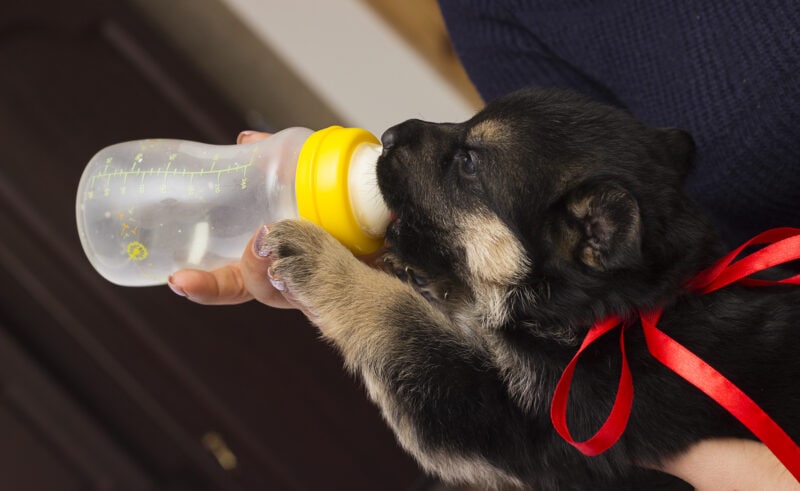
Nursing newborn puppies isn’t easy, and you likely still have some questions floating about milk replacements for puppies. Let’s get down to basics and see if we can help.
What can you substitute for puppy milk?
You can safely replace a mama dog’s milk with a puppy milk supplement. These are typically powder-based recipes similar in appearance to baby formula. They contain a measured blend of must-have nutrients for proper puppy development, including fats, proteins, and carbohydrates.
Should I give my puppy a milk supplement?
You can offer a milk supplement to puppies if your mama dog is struggling to nurse a large litter or if one puppy, in particular, isn’t getting enough milk to eat from nursing alone. However, we always recommend checking with your vet to ensure an underfed puppy isn’t sick.
For weaned puppies over four weeks of age, milk supplements aren’t usually necessary unless recommended by your vet. While loaded with nutrients, they can cause tummy upset in weaned doggos who are used to solids.
What milk can puppies drink?
Most puppies can drink a milk replacement containing cow’s milk, but that doesn’t mean you should give a puppy the cow’s milk you buy off the shelf at a store. Milk replacements made for puppies contain nutrients that ensure proper development and digestion in dogs, including those for brain and bone health.
Some puppies do experience digestive upset with milk replacements containing cow’s milk, and in those cases, you’ll want to opt for a replacement using an alternative milk source such as goat’s milk.
Which milk powder is best for puppies?
The best milk powder depends on your puppy. Like us, dogs have differing needs, and one puppy might thrive on a milk-based power, while another struggles with sensitivity issues and needs an alternative like goat’s milk. As a rule of thumb, we’d recommend aiming for an American-made, vet-formulated recipe for puppies containing a milk source that works for your canine.
How often do puppies need to eat?
New puppies spend most of the first few weeks of life eating and sleeping and should be nursed every 2 to 4 hours. The amount needed per feeding varies by breed, so always check with your vet to ensure you’re feeding the proper amount.
How long do puppies nurse for?
Puppies rely on milk for roughly the first 4 weeks of life. Some puppies may need to be closer to 4.5 weeks of age before they can handle solid food. By this time, your puppies should be happily moving about and trying to leave the whelping box while running, walking, and playing with littermates.
It is wise to have puppy milk replacers on hand before you need them, so you don’t have to make your choice in haste as you look down on a hungry puppy, who’s looking to you for help.
Professional breeders, rescue organizations, and plain-old pet parents with a pregnant dog should go ahead and keep a few days’ worth of milk replacer, should it prove necessary (especially in cases when your dog has more puppies than you were expecting). They aren’t terribly expensive, but the cost you’ll pay for not having one can be tragically high.
***
Have you ever used a milk replacement formula to raise a puppy or two? How did it go? Do you have any tips for raising newborn puppies you’d like to share? How long did it take your puppies to graduate to solid food? Have you tried any of the commercial dog milk replacers discussed above?
We’d love to hear all about it in the comments below!
Need more info on caring for pups? Make sure to also check out our guides on:
- The Best Dog Beds For Puppies
- Best Crates For Puppies
- Best Dog Harnesses for Puppies
- Best Chew Toys for Teething Puppies
- The Puppy Raising Blueprint (an awesome 8-episode video course!)

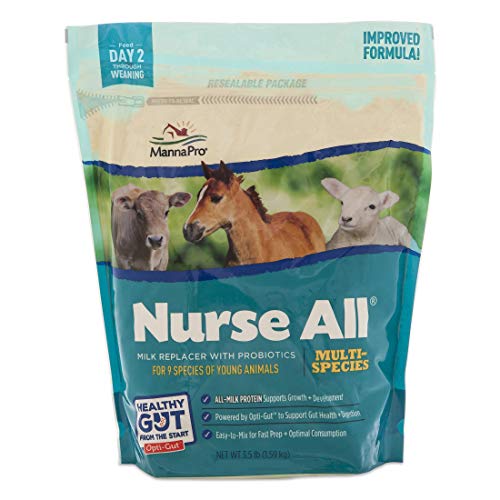







Leave a Comment